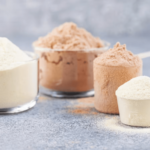
Claudia Zapata
(BSN, M.ed., PGDipBus)
Jump to:
- What is Vitamin B7?
- Vitamin B7 deficiency
- Different types of Vitamin B7
- Health Benefits
- Health Claims
- Best sources of Vitamin B7
- Daily requirements and intake
- How to take Vitamin B7
- Signs and symptoms of deficiency
- Risks and side effects
- Interactions - herbs and supplements
- Interactions - medications
- Summary
- Related Questions
Biotin, or vitamin B7, has a role in the metabolism of fats, carbohydrates and proteins. Studies and research show that it can assist with conditions such as
- alopecia
- dermatitis
- diabetes
- multiple sclerosis
- maintaining a healthy weight
Before we continue with other health benefits, we’ll start first with the history behind biotin (vitamin B7).
What is Vitamin B7?
Biotin (vitamin B7) is an essential micronutrient that belongs to the B complex group of vitamins. It is water-soluble and plays an important role in assisting the metabolism to break down fat, carbohydrates and proteins.
Biotin is indirectly implicated in the production of energy via glycolysis and can affect the immune response, which makes it vital during pregnancy for normal foetal development.[1]
History behind Vitamin B7
Biotin discovery is related to food-animal experiments, when in 1916 W.G. Bateman revealed that animals and humans on a high intake of raw egg whites presented signs of hair loss and skin lesions.
Later, in 1927, Margaret Boas and Helen Parsons encountered similar results when they fed egg whites to rats as their only protein source. The rats developed dermatitis, alopecia, and loss of muscular coordination. The term, egg white injury, was appointed to describe the syndrome.[2]
In 1939, Paul György, a Hungarian-American biochemist, nutritionist and pediatrician, discovered Vitamin H, a molecule in eggs that was essential for metabolism, healthy hair, and skin.
Biotin was first known as Vitamin H
This was later changed to what we know as biotin, when similar properties were found in yeast.
Vitamin B7 deficiency
Biotin deficiency is rare, but it can happen due to
- genetic disorders
- chronic alcohol consumption
- breastfeeding and pregnancy
However, there is no evidence of government fortification programs for these risk groups and no evidence of food fortification in New Zealand.
According to the National Institutes of Health and the Food and Drug Administration (FDA), the amount of biotin a person needs, depends on their life stage and gender, starting from 5 mcg from birth, and increasing to 30 mcg through life, for adults.[3]
Who is most at risk of Vitamin B7 deficiency?
Genetic disorders and vitamin B7 deficiency
Inborn metabolic disorders, such as Biotinidase deficiency and Holocarboxylase synthetase deficiency, are inherited conditions, which have been linked to secondary biotin deficiency due to poor intestinal absorption, decreased formation of holocarboxylases and transport deficiency.
Short-gut syndrome, which is a condition in which a part of the small intestine is unable to absorb nutrients, causes interruption of biotin supply from gut microbes.
Chronic alcohol consumption, smoking and vitamin B7 deficiency
Alcoholism and smoking are two habits that can have a negative impact on biotin levels. Alcohol blocks biotin absorption, especially when alcohol abuse is related to poor dietary intake and smoking has been associated with increased catabolism of biotin to synthesise energy.
Pregnancy and vitamin B7 deficiency
During pregnancy, the rapid cellular division in the creation of the foetus creates a subclinical deficiency of this vitamin, which means that the deficit is mild and it is not recognised in simple lab tests.

Source: Ichihara, Y. Serum biotin level during pregnancy is associated with fetal growth and preterm delivery. J. Med. Invest. (2020)
Biotin is necessary for the synthesis of essential structures, as it participates as a regulator in the control of gene expression, meaning that low levels of biotin can lead to anomalies and fetal malformations, such as cleft palate.
There is also an increased demand for biotin in breastfeeding women since biotin is transported to milk, which can create deficiencies if the intakes are inadequate.
Parental nutrition and vitamin B7 deficiency
Prolonged parenteral nutrition (intravenous nutrition) has been associated with biotin deficiencies when not supplemented.
Consumption of raw egg whites and vitamin B7 deficiency
Raw egg contains a protein called avidin, which binds to biotin, preventing its absorption. Hence consumption of mayonnaise with raw egg can be a risk factor for biotin deficiency.
Chronic liver disease and B7 deficiency
Severely impaired liver function due to cirrhosis, will present low activity of Biotinidase and consequently increased requirements of biotin.[4]
Different types of Vitamin B7
Biotin can be found in nature in two forms. One is free form or unbound, which is produced by the intestinal absorptive cells called enterocytes.
The second form, and the most known, is the form of biotin that can be obtained directly from food sources.
Biotin is also available in vitamin supplements and can be found under D-biotin or biotin.[5]
Our body cannot produce biotin
However, normal microflora, which is our gut bacteria, is able to produce biotin in free form.[6]
Health benefits of Vitamin B7
Biotin is well known for its cosmetic use in promoting healthy skin, hair, and nails. However, its benefits extend beyond the cosmetic industry with proven results in treating conditions such as
- alopecia
- dermatitis
- diabetes
- multiple sclerosis
- maintaining healthy weight
Promoting cell growth
Biotin participates in many cellular processes, including the regulation of genetic expression, promoting the formation of cells during pregnancy.[7]
Current research has suggested that biotin deficiencies during pregnancy can lead to neurological defects.
Takechi et al. investigated the mechanism for cleft palate in embryos and its association to biotin deficiency.[8]
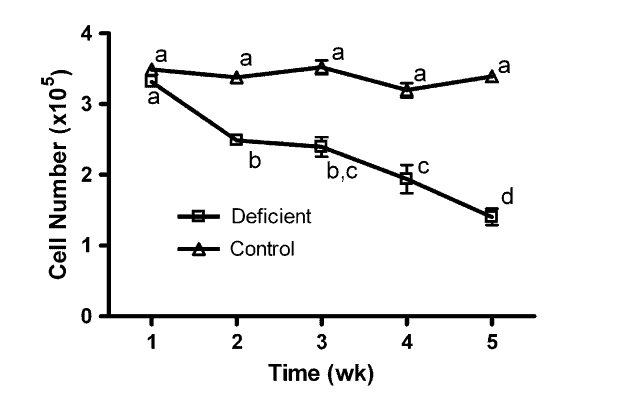
The study showed that biotin deficiency caused suppressed cell proliferation, 41.3% lower after week 2, which could lead to cleft palate.
Coenzyme in the metabolism of fatty acids and amino acids
Biotin participates as a cofactor in many biological processes, including the carboxylase and decarboxylase enzymes, which have an important role in the metabolism of carbohydrates, fatty acids, and amino acids.
Synthesis of glucose from proteins
Biotin participates in gluconeogenesis, which is a process in which amino acids are converted into glucose. If there are low concentrations of biotin in the blood, the conversion of amino acids as energy, when levels of glucose are low, will not be efficient.
Liver metabolism
Biotin stimulates glucokinase, a liver enzyme that increases the synthesis of the storage form of glucose (glycogen). Biotin also triggers insulin secretion in the pancreas.
Participation in the immune response
Biotin regulates the immune function, increasing production of IL-1β (Interleukin 1 – Beta), which mediates the inflammatory response, essential for resistance to pathogens.[9]
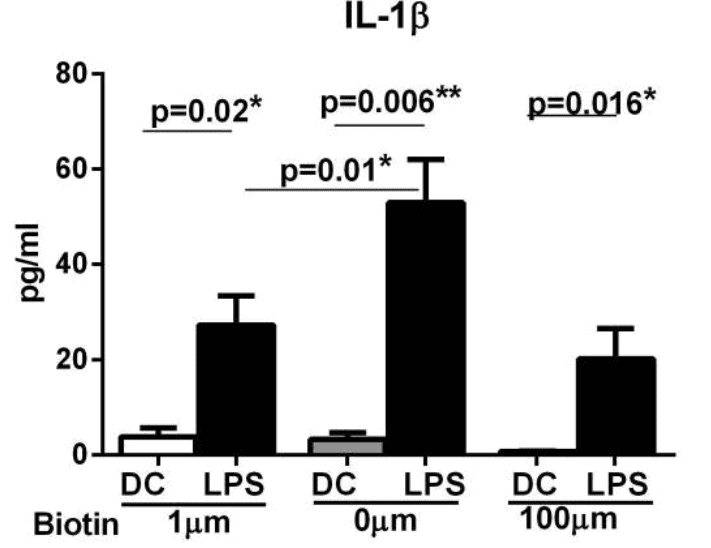
Treatment of Multiple Sclerosis
New research suggests that biotin can play an important role in the reduction of symptoms associated with multiple sclerosis (MS).
This is probably through modifying energy production or improving myelin synthesis within affected brain cells.
After the use of high doses of biotin, the reduction of symptoms was maintained for 9 months. Patients treated with high doses reduced MS progression and improved clinical symptoms compared with the placebo group.[10]
Assisting with Diabetes Mellitus
Severe biotin deficiency can negatively impact glucose levels. In a research conducted on 107 subjects with low levels of biotin, daily supplementation with 9 mg for one month resulted in a 45% decrease in mean fasting blood glucose concentrations.[11]
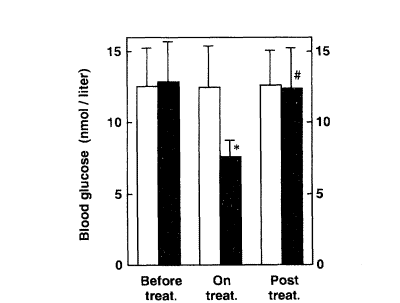
Hypertriglyceridemia
Hypertriglyceridemia is a term used to refer to high concentration of fats in the blood, in this case triglycerides, which can be caused by excess consumption of carbohydrates and sugar. High concentrations can increase the risk of heart diseases.
A study of 33 participants showed that daily supplementation with 61.4 mg of biotin daily for one month resulted in a decrease in triglycerides.
Health claims that still need more evidence and research
Hair and nail health
Research demonstrating the efficacy of biotin in hair and nail growth is limited and inconclusive. When there are inherited conditions for biotin deficiency, supplementation is beneficial.
There is lack of sufficient evidence for supplementation in healthy individuals and it cannot be considered as a treatment for alopecia. However, biotin administration has shown to reverse alopecia in children using valproic acid.[12]
Multiple Sclerosis
The evidence regarding biotin playing a role in the treatment of multiple sclerosis is still inconclusive.
A preliminary study conducted on a small sample of 23 patients with progressive multiple sclerosis, found that high doses of biotin (100-600 mg/day) were associated with clinical improvements (5 out 5 showed improvements on visual health and 16 out of 18 improved mobility of paralysed limbs).
In a different study (placebo controlled group), 13 out of 103 patients showed improvements on their general multiple-sclerosis-related-disability symptoms with doses of 300 mg/day.[10]
Results can be considered promising but larger samples will have to be analysed.
Best sources of Vitamin B7
Biotin can be found in a variety of foods, and we shared the ones that are rich in this vitamin.[13]
Food Source | Concentration (mcg/100g) | Daily Value (DV) Men / Women |
Chicken liver | 187.2 mcg | 623% |
Mustard powder | 158.1 mcg | 527% |
Yeast | 131.3 mcg | 437% |
Basil | 61.5 mcg | 204% |
Beef liver | 41.6 mcg | 138% |
Soy beans | 33.6 mcg | 112% |
Fish | 23.9 mcg | 79% |
Eggs (cooked) | 21.4 mcg | 71% |
Tempeh | 19.9 mcg | 66% |
Natto | 18.2 mcg | 60% |
Peanuts | 17.5 mcg | 58% |
Buckwheat flour | 17.0 mcg | 56% |
Avocado | 10.0 mcg | 33% |
Sunflower seed | 7.8 mcg | 26% |
Salmon | 5.9 mcg | 19% |
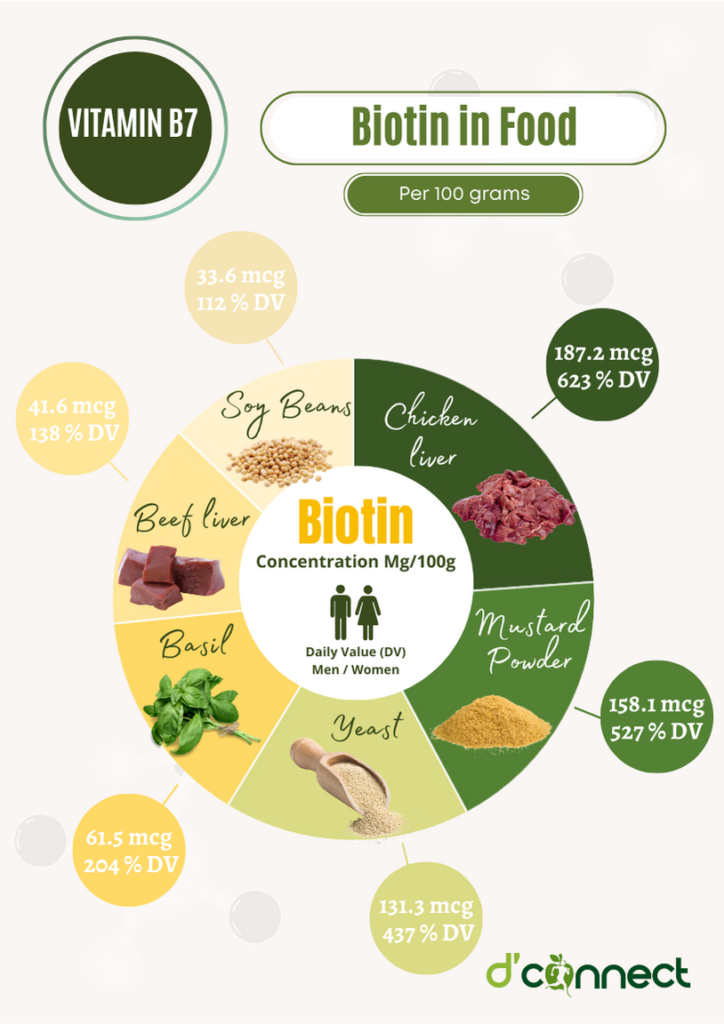
Important note — if you’re enjoying a daily mix of meat and vegetables, you should easily meet your biotin demands.
Daily requirements and recommended intake
Currently there is no sufficient scientific evidence to establish a dietary requirement for biotin.
Instead, the Food and Nutrition Board of the National Academy of Medicine set recommendations for an Adequate Intake (AI) based on extrapolation from data on infants, and on some population intake data from New Zealand.[14]
Age | Male (AI) | Female (AI) |
0-6 months | 5 mcg | 5 mcg |
7-12 months | 6 mcg | 6 mcg |
1-3 years | 8 mcg | 8 mcg |
4-8 years | 12 mcg | 12 mcg |
9-13 years | 20 mcg | 20 mcg |
14-18 years | 30 mcg | 25 mcg |
19-30 years | 30 mcg | 25 mcg |
31-50 years | 30 mcg | 25 mcg |
51-70 years | 30 mcg | 25 mcg |
>70 years | 30 mcg | 25 mcg |
Pregnancy (all ages) | 30 mcg | |
Breastfeeding (all ages) | 35 mcg |
Adequate intake (AI) amounts are listed in micrograms per day.
How to take Vitamin B7 as a supplement
Biotin supplements can be found under the names of H vitamin, D-Biotin and Biotin. Literature suggests that D-Biotin is a more natural form of biotin, however, all forms seem to have the same effect on the body.[15]
Due to its process of absorption, it is advised to take biotin in the morning on an empty stomach. Ideally, it should be taken 1 hour before eating to avoid interaction with other food sources that can have a negative impact on its absorption.
Biotin should be taken on a empty stomach
It’s not recommended to ingest biotin in the evening or later in the afternoon due to the implication of this vitamin’s energy cycles, which can interrupt or have a negative impact on sleep. Also, the absorption won’t be as effective as in the morning.
Common signs and symptoms of Vitamin B7 deficiency
Regardless of the cause of biotin deficiency, the signs and symptoms can include
- thinning hair and hair loss
- scaly dermatitis
- brittle nails
as well as neurological symptoms, such as
- depression
- lethargy
- hallucinations
- paresthesia
Biotin deficiency is rare, which is why it’s important to mention that most of the symptoms are associated with inherited metabolic conditions and they have early manifestation in infancy.
These signs are usually present in the first weeks of life, with most frequent being rash and neurological problems, including acidosis, seizures, hypotonia, and developmental delay.
Issues such as skin rash and alopecia are reversible with early initiation of treatment, and they can also be present in adults with deficiencies.[16]
Skin issues
Biotin deficiency can manifest as red rashes on the skin, especially the face (mouth, eyes, and nose). Usually it is accompanied by an unusual distribution of facial fat in infants.
As the rash progresses, the ears and perineal orifices can be affected. In adults, the rash will manifest as a severe dermatitis.[6]
Eye health
Dry eyes and conjunctivitis can occur due to biotin deficiency.[16]
Hair loss
Hair loss, including eyelashes, eyebrows, and body hair, can occur within 3 to 6 months of the onset.[6]
Energy levels
With low biotin levels, fatigue and lack of energy can be present since biotin participates in energy production in the cell.[4]
Blood glucose levels
Elevated concentrations of blood sugar can occur, given that biotin participates in the regulation of glucose in the body. Individuals with diabetes should be particularly aware of this issue.[11]
Hyperaesthesia and paraesthesia
Burning or prickling sensations in the hands and feet, as well as muscle pain are symptoms that are more common in inherited metabolic disorders.
For adults the symptoms can include sensitive skin (hyperaesthesia), a sensation of pins and needles in the muscles (paraesthesia) and muscle pain.[16]
Seizures
Biotin participates in energy production and synthesis of myelin in brain cells. This is why biotin deficiency has been associated with seizures, due to improper function of the nervous system.
Neurological symptoms
Hypotonia, lethargy, and developmental delay, along with unusual withdrawn behaviour are also recorded as some of the signs and symptoms of biotin deficiency.[7]
Furthermore, due to central nervous system dysfunction, depression is also seen as a common symptom.
RELATED — Introduction to: Depression
Vitamin B7 risks and side effects
The studies involving high biotin intakes have been inconclusive in regards to side effects and the information is not sufficient to establish adverse effects.[6]
This might be due to the nature of this vitamin, as being water soluble, the excess is eliminated via urine.
In 2019 the FDA informed that high doses of vitamin B7 cause interference with a lab test used to diagnose heart attacks and supplements containing biotin above AI have caused false results in lab tests that measure levels of thyroid hormones.[17]
One case of life-threatening eosinophilic pleuropericardial effusion was reported in an elderly woman who combined high doses of vitamin B7 with vitamin B5 supplementation.[4]
Possible interactions with herbs and supplements
There are certain vitamins and medications that can interact with biotin.
Alpha Lipoic acid (ALA) is a supplement used to support a healthy glucose metabolism, healthy ageing, and cardiovascular health.
Since biotin and ALA have the same metabolic route for the absorption in the body, long-term use of ALA can result in low biotin levels.
Pantothenic acid (Vitamin B5), which is used to enhance the metabolism of carbohydrates, can also interact with biotin.
Biotin can increase the effectiveness of vitamin B5, even when having the same metabolic route.[5]
RELATED — Vitamin B5 (Pantothenic Acid)
Biotin can also interact with
- Tobacco — this increases the rate at which biotin breaks down in the body, causing biotin deficiency in extreme causes
- Saccharin — this sweetener can reduce Biotin levels.[5]
Possible interactions with medications
The following anticonvulsants reduce the levels of biotin by decreasing intestinal absorption and increasing renal excretion:
- Primidone (Mysoline)
- Phenytoin (Dilantin, Phenytek)
- Carbamazepine (Carbatrol, Epitol, Equetro, Tegretol)
- Valproic acid
Long-term use of the following broad-spectrum antibiotics decreases bacterial synthesis of biotin:
- Sulfonamide (Sulfa)
- Tetracycline
Studies have shown that biotin deficiency can be resolved by supplementing when using these medications.[5]
Also, when biotin levels in the intestine are low for a long period of time, the immune system can be compromised.
Since one of biotin’s functions is to control Candida in the bowels, our GI tract can be exposed to this aggressive form of yeast.
Summary
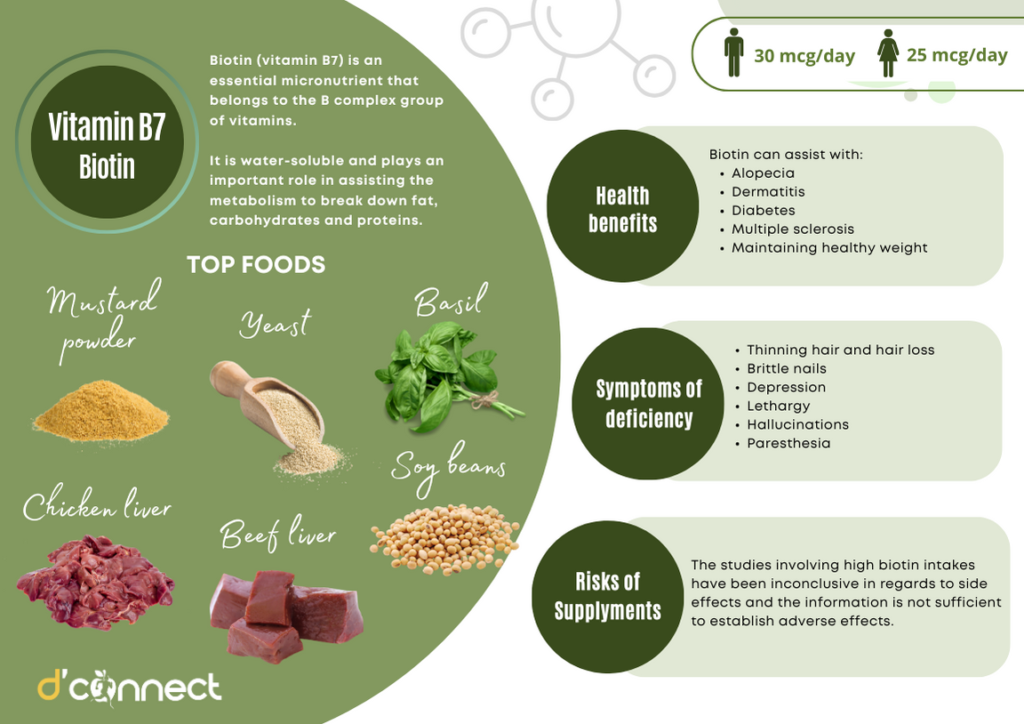
Key Takeaway — In this illustration we have outlined the most important information that you should know about Biotin (vitamin B7).
Related Questions
1. How much biotin should you take for hair growth?
With consumption of 30 mg/day, within 90 days results can be observed.
If the person has a biotin deficiency results might be seen faster.
2. How long does it take for biotin to help nails grow stronger?
With consumption of 30 mg/day, results can be seen around 30 days.
3. What is the best time to take biotin?
In the morning on an empty stomach, 1 hour before eating.
If you are interested in knowing more about specific micro and macronutrients, we suggest browsing our Nutrition section.
Claudia has completed Bachelor’s in Nutrition and Dietetics, Orthomolecular Medicine Diploma, Postgraduate Diploma in business and Master’s in University lecturers.
As a dietitian, she has worked in the Primary and Secondary Health sector, developing plans for health prevention, educating the community and training students to join the workforce. She also published a book, Innovation in University lecturer: A vision from praxis, regarding innovations in teaching strategies for competency-based learning systems.
Claudia is passionate about health prevention and sports, and her goals include educating people and communities on how to live longer and healthier. She is a strong believer that prevention is key to achieving well-being, with nutrition being a fundamental component.
Constantly in pursuit of maintaining a healthy and active life, Claudia practices three different sports, including martial arts and dance.
Claudia believes that by having interventions earlier in life, we can shape the futures of our younger generations, increase awareness and improve their health outcomes. Hopefully, they can then do the same for generations still to come.
References
(1) Berger, M. et.al. (2022). ESPEN micronutrient guideline. Clinical Nutrition, 41(6), 1357-1424. https://doi.org/10.1016/j.clnu.2022.02.015
(2) May, P. (2021). Biotin, Molecule of the month. Retrieved from https://www.chm.bris.ac.uk/motm/biotin/biotinh.htm
(3) National Institute of Health, Office of dietary supplements (2021). Biotin. Retrieved from https://ods.od.nih.gov/factsheets/Biotin-Consumer/
(4) Linus Pauling Institute. (2023). Biotin. Retrieved from https://lpi.oregonstate.edu/mic/vitamins/biotin#drug-interactions
(5) National Library of Medicine, National Center for Biotechnology information. (2023). PubChem compound summary for CID 171548, Biotin. Retrieved from https://pubchem.ncbi.nlm.nih.gov/compound/Biotin#section=Collision-Cross-Section
(6) National Academy of Sciences. (1998). Dietary references intakes for Thiamin, Riboflavin, Niacin, Vitamin B6, Folate, Vitamin B12, Pantothenic acid, Biotin and Choline. Retrieved from https://www.ncbi.nlm.nih.gov/books/NBK114310/pdf/Bookshelf_NBK114310.pdf
(7) Scott, W. (N.D.). Literature review of both classic and novel roles of Biotin (Vitamin B7) in cellular processes. Retrieved from https://jps.library.utoronto.ca/index.php/jns/article/view/33634/25818
(8) Takechi et.al. (2008). Biotin deficiency Affects proliferation of human Embryonic palatal mesenchymal cells in culture. The Journal of Nutrition.
(9) Agrawal S, Agrawal A, Said HM. Biotin deficiency enhances the inflammatory response of human dendritic cells. Am J Physiol Cell Physiol. 2016 Sep 1;311(3):C386-91. doi: 10.1152/ajpcell.00141.2016. Epub 2016 Jul 13. PMID: 27413170; PMCID: PMC5129763
(10) Tourbah A, et.al (2016). MS-SPI study group. MD1003 (high-dose biotin) for the treatment of progressive multiple sclerosis: A randomised, double-blind, placebo-controlled study. Mult Scler. 2016 Nov;22(13):1719-1731. doi: 10.1177/1352458516667568. Epub 2016 Sep 1. PMID: 27589059; PMCID: PMC5098693.
(11) Monsalve, C. (2006). Biotin supplementation reduces plasma triacylglycerol and VLDL in type 2 diabetic patients and in nondiabetic subjects with hypertriglyceridemia.
(12) Deepa P.; Shane M.; Leslie C. (2017). A Review of the Use of Biotin for Hair Loss. Retrieved from https://karger.com/sad/article/3/3/166/291279
(13) Staggs CG, Sealey WM, McCabe BJ, Teague AM, Mock DM. (2016). Determination of the biotin content of select foods using accurate and sensitive HPLC/avidin binding. J Food Compost Anal. 2004 Dec;17(6):767-776. doi: 10.1016/j.jfca.2003.09.015. PMID: 16648879; PMCID: PMC1450323. Retrieved from https://www.ncbi.nlm.nih.gov/pmc/articles/PMC1450323/
(14) Australian National Health and Medical Research Council (NHMRC) and the New Zealand Ministry of Health (MoH). (2005). Nutrient Reference Values for Australia and New Zealand Including Recommended Dietary Intakes. Retrieved from https://www.eatforhealth.gov.au/nutrient-reference-values/nutrients/biotin
(15) Centro colaborador de La Administración Nacional de Medicamentos, alimentos y Tecnología Médica -ANMAT – Argentina (2012). Vademecum
(16) Barker, S. (2004). Biotin responsive dermatoses, Dept of Dermatology Waikato Hospital, Hamilton, New Zealand. Retrieved from https://dermnetnz.org/topics/biotin-responsive-dermatoses
(17) FDA U.S. Food & Drug Administration. (2019). FDA in Brief: FDA reminds patients, health care professionals and laboratory personnel about the potential for biotin interference with certain test results, especially specific tests to aid in heart attack diagnosis. Retrieved from https://www.fda.gov/news-events/fda-brief/fda-brief-fda-reminds-patients-health-care-professionals-and-laboratory-personnel-about-potential






